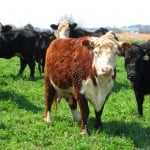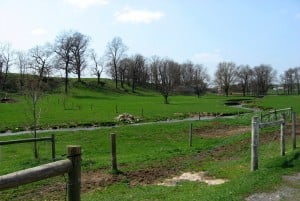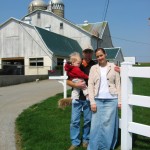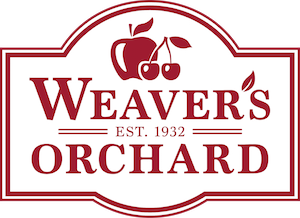
If you talk long enough to Ernie and Elmina Beiler, owners of a small cattle farm in Gap, PA, they’re bound to mention the word “value.” They believe their work enriches their lives. They have had customers echo the sentiment, too, saying that choosing high-quality beef from local, humanely raised cows adds value to their lives. Weaver’s Orchard also sees the value behind this farm’s humane and all-natural methods, and has been buying from this vendor since 2009.
The Beilers’ Lone Star Farm winds over 82 acres, overlooking Lancaster County hillside and cut through with streams. This generous space for 70-80 cows lets the animals graze fresh and different pastures, and it lets the Beilers grow the corn silage the cows eat during the finishing stage.

In large pastures, calves graze with their mothers for about nine months, until, says Elmina, “the calves are almost as big as the mothers.” These calves spend the next 11-15 months in the roomy barn and large connected outdoor enclosure, eating a balanced diet of hay and corn (stalk and all). Even the meat processing stays in Lancaster County and in the family: Ernie’s cousin owns the USDA inspected Smucker’s Meats, a plant designed for as much care and as little stress on the cattle as possible.
Ernie emphasizes that the way the cows are raised is vital. If humans “don’t eat a balanced diet, it does funny stuff,” he says. Likewise, caring for an animal’s diet decreases the odds that it will get sick. Sick cows often have to be treated with antibiotics, and this means that these cows would have to be removed from Lone Star’s usual all-natural, antibiotic-free program and sold or auctioned instead. But Ernie says proudly that he rarely has to do this. None of this year’s yearlings have been sick or had antibiotics.
Keeping cows as happy and healthy as possible is a great deal of work. Strenuously avoiding antibiotics means avoiding overcrowding and the messy conditions that result. It is hard work, but it’s work the Beilers love. “If you want to be farming these days,” says Ernie, “you’ve got to like it.” Elmina adds, “You have to know why you’re doing it.”
So why are they doing it? It’s where God has them, they respond. “Any time you get to work with earth and open space and cattle, you’re working with creation,” says Ernie, and the Beilers love country life and working outdoors. The family shares this love of country life with urban children. Working through a downtown Lancaster ministry, the Beilers bring urban kids to spend time on the farm.

There’s another reason they’re farming, too. Farming provides a chance for families to do different types of work all in the same environment. It is a rare privilege for couples to work at the same place, and Elmina says the chance to communicate all day long strengthens their eight-year marriage. Their four kids benefit from having the business at home, too. As homeschoolers, they can enjoy the farm all day long, learning what it takes to start and sustain a business, and beginning to “get the mindset of a business owner,” says Elmina. Ernie adds that he loves to be around the family, and is glad he’s been able to give up the trucking job he maintained for 13 years that took him away from his wife and children. “It’s been a dream come true,” he says.
As they raise free-range beef, Lone Star Farm’s humane and healthy practices bring value not just to the lives of those who make a good meal from their meat, and not just to the lives of the farmers themselves. There is a cultural value here, too. In Harper’s Magazine, philosopher and subsistence farmer Roger Scruton argues that “carnivores” who care to make sure livestock farmers use ethical practices will save our food culture from greedy, thankless eating and the absence of animal nurture that results from this. “Where there are conscientious carnivores, there is a motive to raise animals kindly,” writes Scruton. A traditional, small-scale beef farmer, says Scruton, “treats his cattle as well as cattle can be treated, and such animals are as happy as their nature allows.”
Truly, the word “value” is the right one to use when thinking about food. Considering what brings value to our lives as eaters, as well as what adds value to the lives of animals and nearby farming families, will sustain local agriculture and give us a more balanced understanding of what’s on the table.
